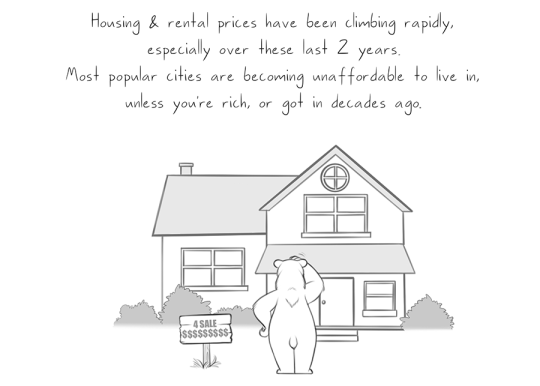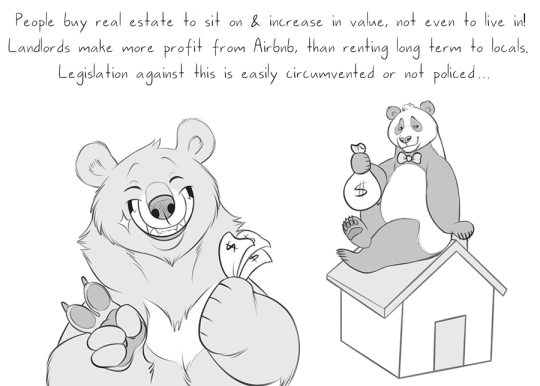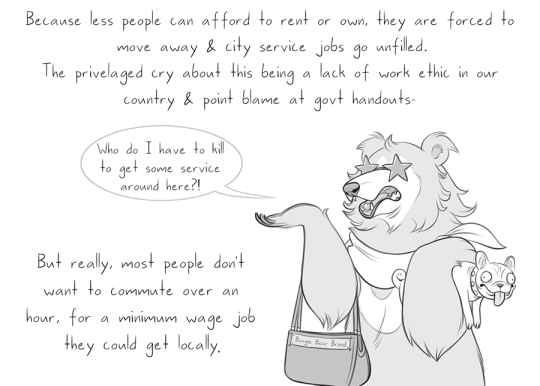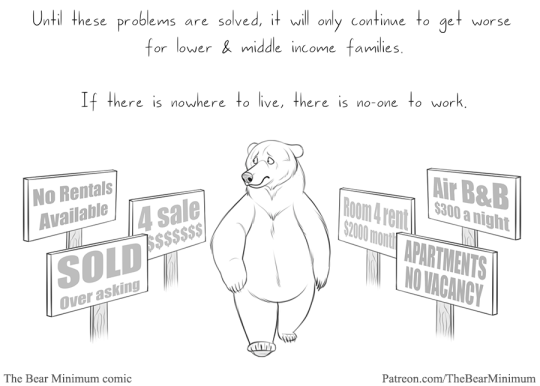#decommodified housing
Text
btw there is no way out of the housing crisis that doesn't involve massive amounts of public housing and the sooner the neolibs internalize this, the sooner they can stop spinning their wheels
We can't upzone, incentivize, luxury apartment, and deregulate our way out of this one lads
#yes#I am aware that the wheel spinning is on purpose#yes I am aware that they don't want to decommodify housing#but#if what my fellow leftists purport to believe is true#a lot of us haven't realized that these ice chewing freaks are were and remain our enemies
8 notes
·
View notes
Text


illustrations for the local housing committee! if you're a verdun tenant you should hit them up / get involved with some of the working groups!
https://cacv-verdun.org
bonus material: rejected cat faces (1- literally demonic 2- gros matou type bitch too goofy for the job)

#illustration#2D#CACV#verdun#housing#tenants rights#duality of cat#decommodify cheese#landlords get glomped
12 notes
·
View notes
Note
I just found out about Jasmine Sherman and they look really cool. Like, the policies that they say they’re going to do? The fact that they have an audiobook option for people to listen to what the policies say on their platform? (If people don’t have JAWS or screen readers on their devices, JAWS for computers.) I really hope they get far enough in the presidential race.
vid source

It's time to actually put the people in America first. We do that by meeting everyone's basic human needs. This includes guaranteed housing, universal healthcare and education, UBI, and environmental/infrastructure reform. In doing this, we give people a fighting chance to create a more sustainable model for society that ensures the general welfare of people within our borders for generations to come.
1) Housing- Decommodify housing and eliminate rent, mortgages and property taxes 2) Healthcare- 100% coverage including vision and dental 3) Education- universal education up to and including doctorate level studies 4) UBI-a monthly disbursement based on the cost of living in a resident's state 5) Environment/Infrastructure reform- Abating the damage caused by climate change through sustainable development and creating an infrastructure that fosters community
The Jasmine Sherman for President campaign envisions organizing through various strategies. They aim to leverage social media and technological advancements for rapid outreach to a wider audience. Direct action and mutual aid will be prioritized to attract like-minded individuals and build a strong support base. The campaign will also focus on nurturing relationships established through past coalition-building efforts, aiming to strengthen connections and amplify the campaign's impact. By combining these approaches, Jasmine Sherman's campaign aims to effectively engage, mobilize, and expand its reach in pursuit of its organizing goals
Source on ballotpedia
Their campaign site:
MISSION STATEMENT/ Political Views
Jasmine Sherman wants to help the at-risk and vulnerable communities by providing Guaranteed housing, Landback, Universal basic income, Free Education, and Universal healthcare, for all. They also believe in the rights of the child, the rights to gender affirming care, ending the disability restrictions, restorative justice, abolishing the police, abolishing prisons, triple bottom line accountability for corporations, reparations, a progressive tax, an index living wage, immigration policy reform, sustainable energy, decriminalizing all drugs and sex work, age caps and term limits for all elected officials, and rewriting the constitution.
••••
They seem like a very good candidate and I hadn't heard of them before, tysm for bringing them to my attention!
Looks like the Green Party has ballot access in 46 states as well! Additionally, The Green Party will host a primary debate on May 11th. Definitely something to pay attention to!
#asked#answered#jasmine sherman#usa election#2024 election#socialist candidates#presidential elections#presidential candidates#vote#voting#usa#usa politics#us election
189 notes
·
View notes
Text
Degrowth is often associated with austerity, that we have to give up all the luxuries we have. But, not everything, I would say, and we also gain something instead. So, here’s my explanation. First of all, I’m not saying, as I said, that we have to give up all the technologies. I explicitly admit we need renewable energies and electric vehicles. These are the things that we need to develop even more. So, degrowth is not about going back to nature without any kind of Zoom, computer, iPhone, and so on. But at the same time, we have to question whether we need to buy a new iPhone every two years—that’s probably excessive, and we can repair things.
Or another question would be, do we really need fast fashion? Do we need so much meat consumption? I’m not saying we should all be vegans immediately. But at the same time, we can start questioning whether our level of consumption might be actually excessive, and there are some people who are actually consuming much more in an excessive way, people that are super rich. So, first, advocate reducing economic inequality because the super rich do not simply exploit workers, but also they’re quite responsible for the current ecological crisis. The top 1% of rich people are responsible for 15% of carbon emissions. So, that’s something that must be reduced.
For example, I advocate banning private jets. Do we really need so many private jets? And we should probably reduce cruise ships and industrial meat production. These excessive things must be reduced. That’s my first proposal. And the second proposal is, if we give up some of those things, we will have different kinds of abundance. I argue in my book that this will be an abundance of public goods. In the U.S., for example, education is commodified, and we have to pay a lot of money to go to university, and students have loans. Also, we have to pay a lot to go to a doctor because medical care is privatized and commodified. Public transportation is poor, so we have to buy cars, and we again have to have loans and so on.
So, our entire economy is commodified, and that means that we have to pay for everything, no matter how necessary these things are for everyone. And so, you need money and have to work harder, but jobs are precarious; wages are low, so you work longer hours, and when you still don’t have enough money, you have little time to spend with your family and friends, and so you’re unhappy. So, my proposal is in a degrowth economy, all those basic services and goods must be decommodified. Education should be free. Medical care, public transportation, electricity—all these things should be as cheap as possible.
And then you don’t really have to work so hard, and you don’t have to worry so much about your housing, future, and applications. These are the things that can make you feel much more happy and secure. That kind of public abundance can actually be realized without constant economic growth. Degrowth is a kind of new radical abundance.
86 notes
·
View notes
Text
one last thing on this and then i’ll shut up—it’s actually good for there to be single-family homes on the rental market, because it means that people who maybe don’t have the money or credit for a mortgage can still live in a single family home if they want to.
the person or company who owns that home is gonna make a lot more money renting it out (thousands of dollars a month more!) than just sitting on it and leaving it empty, so most owners are going to rent out their property. the idea that corporate landlordship is okay for renters of apartments but not for renters of single family homes is a weird one.
“actually, all corporate landlordship and actually landlordship as a whole concept is bad!” okay cool but until ye olde glorious revolution comes, that’s the system we have, and if you forbid corporate landlords entirely, then there will be no new housing built Ever because there’s no way for the company that builds the housing to get the money back. the average joe does not have the ability to finance the construction of an apartment building.
i wish we could decommodify housing! but that’s not gonna happen anytime soon so in the meantime we need a lot more checks on landlords (banning rent gouging and enormous application fees, stricter punishment for breaking the rules we have, banning no-cause evictions, etc) AND (sorry to belabor the same point as always but it is once again true) to allow a larger supply of units, because landlords have more incentive to behave well if it’s easier for a renter to move somewhere else.
one story to illustrate this point and then i’m done. I had a friend in college who had no hot water for two months and also a dead rat in her wall for a month. why didn’t the landlord take these issues seriously and fix them? because they had no incentive to, because there was a less than 0.5% vacancy rate in the town, because the town had built no new apartments for 20 years. so all the badmouthing to your friends about your shit landlords and all the bad reviews etc in the world would have no impact, because someone would still rent from you because they needed housing and it was so hard to find it. landlords (including these investment firms) WANT supply constraints because they can charge more money, grow the value of their investment, and not have to compete in a truly competitive housing market
40 notes
·
View notes
Text
Sheetal Chhabria sets her finger on the core of a shared problem that her book Making the Modern Slum: The Power of Capital in Colonial Bombay, Yahia Shawkat’s Egypt’s Housing Crisis: Shaping the Urban Space and my own Possessing the City: Property and Politics in Delhi 1911-1947 are outlining. The settings and periods are diverse and the particular histories diverge. But, in each of our work, we point to both the commodification of shelter and the paradoxical histories of efforts to oppose or mitigate that commodification. The Housing Question – how to provide decent and dignified shelter to every human – seems to be hummed to a drearily repetitive tune (with a few varying notes) in the Global South. Indeed, many of the same problems are reproduced in the Global North as well.
The stubbornness with which mass housing initiatives are reinserted into commodity circuits is a key lesson in all three works. This despite a related phenomenon that Chhabria points to the sheer variety of ways in which housing has been used by the state to ‘manage populations’. Chhabria and Shawkat both refer, for instance, to moments in which housing has been utilized as a tool to ensure the immobilization of working populations. Much like in a prison, to use housing as a way to prevent or restrict the mobility of working people.
---
Part of the reason for this is that Chhabria’s work on Bombay culminates at a point of unique labor mobility: the migration away from the city of much of Bombay’s mill labor force in the wake of the late nineteenth century plague epidemic. [...] But it was also a project of housing in which luring workers back to the city and holding them there was an essential component. The Bombay Improvement Trust (BIT), whose trajectory from inception to failure Chhabria meticulously chronicles, bears the marks of exactly such an origin point. The BIT was in the final reckoning a mix of welfarism, state-subsidy for financial speculation, attempts to signal a more sanitary city and immobilising labour. [...] However, this limited decommodification of shelter was a mere sub-theme among the other agenda of the BIT.
Crucially, Chhabria points out, Indian elites and the colonial state joined in their appreciation of the opportunities for profit-making and governing on the cheap, while solving labor supply problems through the BIT’s housing initiatives.
In Shawkat’s Egypt too, both in the late nineteenth century and in the present, the ‘izba recurs as a form of housing designed to immobilize labor – converting peasants more fully into workers. [...]
---
The slum must also [...] be an active source of a reserve army of labor. [...] Here the establishment of a Delhi Improvement Trust (in 1937, nearly 40 years after the BIT) was initiated by a piece of bad press. [...] The DIT’s major success was in [...] (something that Chhabria points out happened in Bombay too) participating in a round of speculative development in the Delhi countryside. [...] These and myriad other pathways have tended to return housing – even housing built at subsidized rates for the city’s working poor – to circuits of accumulation and profit.
---
Shawkat [...] is clear-sighted about the terminal point – decommodified housing. Any intermediate position, he argues, would prove unstable and return housing to the circuits of capital circulation. [...] As I have been pointing out, each of our three works provides templates by which waves of partial decommodification are clawed back into circuits of profit and loss.
How, then, could a more permanent extrication of shelter from commodification be achieved? The unsuccessful efforts to decommodify housing in colonial Delhi illustrate some potential pitfalls. [...] The weakness of struggles to decommodify housing in Delhi meant that even housing for Partition refugees would become the launchpad for what is today India’s largest private real estate firm -- Delhi Land and Finance. [...]
---
The Housing Question, cannot be separated from the much broader question of power. Mobilizations from below which are committed to a vision of broad human emancipation are the only viable way forward. Neither a brilliant urban plan nor the temporarily persuaded ear of a state official can achieve the decommodification of shelter that Shawkat calls for. [...] Stubbornly enough, [...] at the heart of it tends to lie a nexus between industrialists, richer traders, real estate speculators, and the state. Yes, temporary relief might be won [...]. But, as the history of the return of housing to circuits of commodity demonstrates, [...] the battle to provide shelter as a right is first about building [...] [movements] that can fight and win a broad decommodification of everyday life.
---
Text by: Anish Vanaik. “Shelter as Capital: Housing and Commodification: Lessons from the Global South.” Borderlines [open-access site mentored by editors of Comparative Studies of South Asia, Africa and the Middle East]. Published online: 18 February 2021. [Bold emphasis and some paragraph breaks/contractions added by me.]
117 notes
·
View notes
Text
Standing at the bus stop back hurting pissed as Hell because I remember there used to be benches. There used to be benches EVERYWHERE as a teen. But my city has slowly stripped them from public life because they hate homeless people so bad.
The problem won't go away until we decommodify housing but we collectively suck off landlords sooo hard that instead we punish homeless people with sweeps again and again until they agree to live in tiny clustered uninsulated shacks in little camps or leave or sleep in doorframes and people pretend not to see them it sucks it fucking sucks
4 notes
·
View notes
Text
Perfect Storm: Roleplaying Your Way Into Understanding the Forces For and Against Climate Action, With Dr. Sourayan Mookerjea
On today’s episode, we’re talking about board games! Ariel interviews Dr Sourayan Mookerjea, Professor of sociology at University of Alberta, about the game “Perfect Storm”, which he uses in his classes and beyond to teach players about the complexities of a sustainable energy transition in the province of Alberta, and Canada more widely. We talk about the different meanings of “energy”, green capitalism, degrowth, decommodifying housing, and more!
Links:
Dr Mookerjea’s profile at U of A
“Perfect Storm” description via Just Powers
3 notes
·
View notes
Text
Because I wrote an entire essay for some guy on discord and I figured might as well put it somewhere someone might actually read it (some things are lacking context but just keep reading the arguments I'm refuting are mostly kneejerk reactions that will be evident from my response):
Capitalism does not address scarcity. It vastly, VASTLY overproduces cheap consumer goods (christmas gift type goods are made in the billions months or even years before the year they're to be sold in, completely divorced from market predictions) while completely neglecting or making unattainably expensive essential goods like high density housing, public transit vehicles, life saving medication, quality food, etc.
Capitalist profit-seeking drives unnsustainable food practices like intensive animal agriculture, monocropping, industrial fertilizer and chemical weeding. Causes cities to implode by building endless suburbs whose tax income does not cover the costs of road and utility maintenance as well as moving industry to areas with cheaper labor and destroying ecosystems with illegal or unregulated dumping and pollution. Insulin is VERY cheap to make and the patent was sold for $1 decades ago. It has gotten more expensive even relative to other expensive medications, soaring dozens of times faster than inflation would imply. After WW2, car companies that made absurd amounts of money off of building tanks and planes then bought up public transit across the US and literally stacked it in a pile and burned it. There's photos of hundreds of burnt out streetcars with Henry Ford (who inspired parts of Mein Kampf and profited off of Jewish slave labor before the war btw) smoking a cigar and looking rather pleased with himself in the foreground. These are just off the top of my head
[9:41 PM]Now for how non-capitalist economies differ:
When removed from the stress of having to earn a living and the desire to accumulate enough to give their children a better life, most people are often very willing to help each other out for free. Under the stress of capitalist workdays (which are literally designed to make you too tired to think, shorter workweeks and workdays have been proven to significantly improve productivity in all sectors), people don't have the energy to spare to help their neighbor. However, pretty much everyone expresses some desire to make the world a better place if they were able. What would you personally do if you didn't have to worry about rent or your next meal or clothes or transportation ever again? Maybe play video games and [redacted] for a week straight but after that? Pretty much everyone is gonna say "hang out with loved ones and cook food."
All necessary forms of labor/work are enjoyable or at least bearable in the name of the greater good to some people. There are people who fucking LOVE picking up trash, like being a sanitation worker is literally the only job they ever want to have. A pretty sizeable chunk of the population enjoys growing plants and taking care of animals and there are methods of farming that require remarkably little effort. Pretty much everyone has a hobby they either currently enjoy or would love to pick up that is required for people to have comfortable lives, but cannot dedicate themselves to it because it would not be profitable enough to live off of
[9:56 PM]decommodifying goods and services fixes this, everyone can do at least one of the things they like doing because there is no threat of violence if you don't work (violence meaning eviction, starvation, freezing to death, etc) In addition to refocusing labor on what actually makes people enjoy their labor, it makes it pretty easy to keep up with demand. "Oh we need more food? Ok well go give people some seeds from the seed library and tools from the tool library. Now we have more food." "We need more clothing? Ok tell the sheperds to let more of their flock have kids and the textile mills to work an extra thirty minutes a day for the next month" (side note, there's finally been developments in automating clothesmaking. Tailoring will be more important after capitalism to ensure clothes are better fitting and last longer but the general forms won't need slave waged third world workers anymore soon)
[9:59 PM]Without states or capitalists to bicker over resources, there's no reason for wars. There will still be some interpersonal violence but without needing drug money to make life bearable (or like, baby formula bc apparently it's violent crime for someone to shoplift baby formula) how often do you think there will be THAT much violent crime? (although various other forms of hierarchy will need to be torn down in order to stop hate crimes like lynchings, mass shootings, and rape)
honestly really the only refutation needed for this as you have worded it is paleontology. Some of our most ancient ancestors have signs of living decades after debilitating injuries that would have rendered them utterly useless to family and unable to care for themselves. This necessitates that they were cared for at great inconvenience for upwards of fifty years tens of thousands of years before the earliest hints of civilization, let alone the currency to pay for a hospice nurse
[10:07 PM]Also, even in the context of mineral mining, without the need for phone companies to sell phones every year, electronics will become much longer lasting and more selectively repairable, meaning less minerals will be removed from use and fewer minerals will be needed to support all the products that are never actually bought in the first place. Even more so with cars, public transit vehicles carry orders of magnitude more people for relatively similar requirements and they don't even NEED conflict minerals in some cases because of overhead electricity being a solution to the tyranny of the battery equation (has someone coined that phrase yet? it seems like a very obvious parallel to the rocket equation now that I think about it but anyways) ok I think I've completely poured my remaining braincells for the day into this I'm gonna take a nap now
8 notes
·
View notes
Text
VISION & OBJECTIVES:
Our vision is to decommodify housing to prevent displacement, unaffordable housing, homelessness, and create sustainable, accessible homes.
Upon sale of a rental property, existing tenants may become in jeopardy of being displaced or subject to unaffordable rent increases, therefore the Occupancy Mission Community Land Trust can play a significant role in acquiring and stewarding such land to prevent further unhoused minority communities and under-served populations. By acquiring properties that may otherwise be potentially sold to big money real estate investors, our community land trust can qualify for a property tax welfare exemption & help tenants retain permanent affordable housing by removing the property from the speculative market. Occupancy Community Land Trust will then own and steward the land, while providing home ownership through a 99 year ground lease.
Our 1st goal is to purchase at least 2 multi-family properties in the San Gabriel Valley region of Los Angeles County (unceded Gabrieliño Tongva land). These properties will preserve a total of 6 units / homes with permanent affordable housing. Upon acquisition of these properties, we can then potentially assist tenants with costs for home rehabilitation that may be needed.
0 notes
Text
1 note
·
View note
Link
Capitalism relies on maintaining an artificial scarcity of essential goods and services (like housing, healthcare, transport, etc), through processes of enclosure and commodification. We know that enclosure enables monopolists to raise prices and maximize their profits (consider the rental market, the US healthcare system, or the British rail system). But it also has another effect. When essential goods are privatized and expensive, people need more income than they would otherwise require to access them. To get it they are compelled to increase their labour in capitalist markets, working to produce new things that may not be needed (with increased energy use, resource use, and ecological pressure) simply to access things that clearly are needed, and which are quite often already there.
Take housing, for example. If your rent goes up, you suddenly have to work more just to keep the same roof over your head. At an economy-wide level, this dynamic means we need more aggregate production — more growth — in order to meet basic needs. From the perspective of capital, this ensures a steady flow of labour for private firms, and maintains downward pressure on wages to facilitate capital accumulation. For the rest of us it means needless exploitation, insecurity, and ecological damage. Artificial scarcity also creates growth dependencies: because survival is mediated by prices and wages, when productivity improvements and recessions lead to unemployment people suffer loss of access to essential goods — even when the output of those goods is not affected — and growth is needed to create new jobs and resolve the social crisis.
There is a way out of this trap: by decommodifying essential goods and services, we can eliminate artificial scarcity and ensure public abundance, de-link human well-being from growth, and reduce growthist pressures.
238 notes
·
View notes
Quote
Whether we dwell in caves or in condominiums, housing is a universal human practice. Home is an extension and expression of our capacity to create. It takes an infinite variety of forms, but making a home for ourselves is an essential and universal activity. Residential alienation is what happens when a capitalist class captures the housing process and exploits it for its own ends. Hyper-commodified housing is alienated housing. It is dominated by people who see dwellings through the eyes of an investor interested in profit or a technocrat interested in control, instead of seeing it as a social right. Commodified dwelling space is not an expression of the residential needs of those who live in it. It is determined by landlords, sublessors, management companies, real estate developers, banks, bailiffs, and bureaucrats–by the ensemble of social roles and institutions that prop up the seemingly inhuman laws of housing markets in contemporary society.
David Madden & Peter Marcuse, In Defense of Housing: The Politics Of Crisis
#quote#in defense of housing#david madden#peter marcuse#housing#housing crisis#affordable housing#universal housing#housing for all#decommodification#capitalism#market urbanism#urbanism#socialism#marxism#alienation#social housing#public housing#non-market housing#decommodified housing
394 notes
·
View notes
Photo




Comic #274: - Housing Crisis - Website links: here!
I don't claim to have all the answers, but I can identify a problem when I see it. House prices have been soaring & income has stagnated for the middle & lower class. With the Zoom boom; this problem is spreading out so far from cities, that it is affecting even rural & small towns now. How far will we be chased from population centers in order to afford to live?
#bearcomic#The Bear Minimum#housing#housing crisis#affordable housing#real estate#home ownership#remote work#zoom boom#decommodify housing
505 notes
·
View notes
Text

#coronavirus#covid 19#covid19#pandemic#homelessness#poverty#income inequality#wealth inequality#anti capitalism#housing#rent is theft#housing for all#decommodify housing#decommodify necessities#all power to the people
9K notes
·
View notes
Text
Capitalism and “American individualism” really got people out here thinking that they’re entitled to just hoard wealth and resources because their corporate controlled government in power says it’s okay and encourages it and bails them out when they can’t afford it for a min and then have the gall to get mad when others criticize them for fucking hoarding their wealth and resources during a pandemic. Like yeah asshole you should be forced to give away your housing when there’s homeless people tough shit you fucking brain-addled sociopath
#Marx was right abolish private property#decommodify what should be considered human rights#food housing healthcare boom that’s right baby
1 note
·
View note